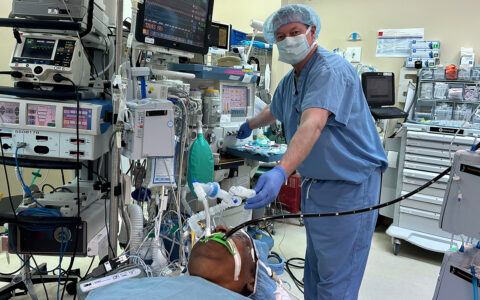Decreasing consumption of carbohydrates, particularly simple sugars, reduces the cardinal symptoms of gastroesophageal reflux disease (GERD): heartburn and reflux, according to a new study from investigators at Vanderbilt University Medical Center.
Published in The American Journal of Gastroenterology, the study shows reducing daily intake of simple sugars by 50 to 60 grams – or about 15 teaspoons – improves GERD-related symptoms, including acidic esophageal levels, rates of reflux, heartburn and regurgitation, acid-like taste, and sleep disturbances.
Researchers at Vanderbilt’s Division of Gastroenterology, Hepatology and Nutrition were prompted by previous findings to launch the study, one of the first randomized controlled intervention trials for dietary management of GERD as it relates to varying intake levels and types of carbohydrates, including simple sugars.
“I hope clinicians will include this information in their discussion with patients on how to manage GERD,” said nutrition scientist Heidi J. Silver, Ph.D., R.D., senior author of the study.
The diet of patients enrolled in the study who reported GERD symptom relief had consumed slightly more than half of the 34 teaspoons of simple sugars consumed by the average American each day.
“It’s important to understand that a person does not need to completely eliminate all simple sugars but to reduce them,” added Silver. “For all foods and nutrients, it’s about not consuming excess. If a person only reduces the number of cans of soda or glasses of sweet tea that are consumed each day, that will make a substantial impact.”
Early Clues for Carbs
The new finding stems from a serendipitous discovery made by Silver and colleagues during an earlier diet intervention study conducted over 16 weeks in 144 women with obesity.
That study provided participants with a moderately high fat/low carbohydrate diet. At the nine-week check-in, Silver noted participants with GERD were no longer reporting symptoms and many had discontinued taking their prescribed and over-the-counter GERD medications.
“The purpose of that study was to investigate the effects of dietary fats on energy metabolism and weight loss, but we had a very intriguing finding that warranted further exploration,” Silver said.
Study Design
In the new randomized controlled trial, Silver and colleagues enrolled 98 patients with GERD and divided them into four diet intervention groups that varied in the amount and type of carbohydrates allowed: high total/high simple; high total/low simple; low total/high simple; low total/low simple.
“It’s important to understand that a person does not need to completely eliminate all simple sugars but to reduce them. For all foods and nutrients, it’s about not consuming excess.”
The group consuming high total carbohydrates and high simple sugars, designed to mimic a typical American diet, was considered the control group.
Meals were prepared in Vanderbilt’s Metabolic Kitchen Core and provided to participants weekly. The researchers used 24-hour ambulatory pH monitoring at baseline and again after nine weeks of diet intervention to evaluate esophageal acid exposure time and total number of reflux episodes. Participants also completed two validated questionnaires to assess GERD symptom frequency and severity.
Study Results
At the end of the nine-week study, all participants in the carbohydrate modification groups had improvements in GERD symptoms.
Based on the pH monitoring results, the researchers found that the high total/low simple carbohydrate group and the low total/high simple carbohydrate group had significant reductions in acid exposure time and total number of reflux episodes.
“It could really move the efficacy of routine clinical practice for symptomatic GERD if physicians would refer patients to a registered dietitian who would do a comprehensive assessment of the diet, including simple sugar intake, when they meet with patients.”
However, the low total/low simple carbohydrate group, which the researchers hypothesized would display the largest impact, did not differ significantly from the control group. She speculated that this group may have been less committed to the diet or had issues with monitoring compliance.
“Excess simple sugar intake is widely prevalent in our society – the average American consumes about 34 teaspoons per day. Even if a reduction in simple sugars doesn’t improve GERD symptoms, it may have other beneficial effects on body weight and reducing risk for chronic disease, which would improve overall health. There’s no potential harm,” she said.
Swapping Anecdote for Evidence
While patients with GERD are often encouraged to avoid certain foods or ingredients, including acidic, fatty or spicy foods, as well as coffee, chocolate, mint, and carbonated beverages, Silver explains that very few studies have rigorously examined the relationship between dietary factors and GERD.
“Out of all of those, the only two that have been fairly well studied are chocolate and coffee. The rest are based on patient anecdotes,” Silver said.
“It could really move the efficacy of routine clinical practice for symptomatic GERD if physicians would refer patients to a registered dietitian who would do a comprehensive assessment of the diet, including simple sugar intake, when they meet with patients.”





